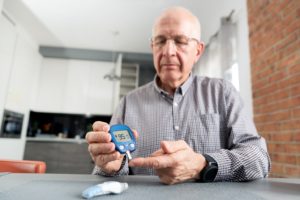
If you have been diagnosed with prediabetes, you are probably working to reverse your condition by making dietary changes. Without a doubt, nutrition will play a large role in your future health. But did you know that the quality of your sleep can also have a bearing on whether your prediabetes progresses into type 2 diabetes? Let’s talk about the concerning connection between prediabetes and sleep apnea.
Poor-Quality Sleep and Prediabetes
A recent study carried out by researchers in the United Kingdom asked 40 prediabetic patients to take a questionnaire about the quality of their sleep. After analyzing the data, the researchers found that the individuals who reported low-quality sleep tended to have higher A1c levels than those who enjoyed restful sleep. (A1c is a measurement of average blood glucose levels over a period of three months.) Patients with a high A1c are at the greatest risk of their prediabetes developing into full-blown type 2 diabetes.
The link between inadequate sleep quality and diabetes has been established for many years. However, this study is among the first to look specifically at the connection between prediabetes and sleep quality.
Sleep Apnea and Prediabetes
Of course, it is worth acknowledging that there are numerous causes of poor-quality sleep, including mental health issues, aches and pains, and more. In many cases, though, the main culprit behind troubled sleep is obstructive sleep apnea (OSA).
OSA is a disorder characterized by repeated interruptions in breathing throughout the night. These episodes, called apneas, can lower blood oxygen levels and prevent an individual from spending enough time in the deeper phases of sleep. As a result, they wake up feeling exhausted.
Improving the Quality of Your Sleep
If you have prediabetes, it would be worth your time and effort to think about the quality of your sleep and make any necessary adjustments to improve it. Here are a few practical suggestions to get you started:
- Get tested for sleep disorders. Spending a night in a sleep clinic can reveal whether you have OSA and how severe the condition is. If you are diagnosed with it, you can begin to explore treatment options.
- Make lifestyle adjustments. Many individuals find that they sleep better when they cut back on alcohol and caffeine, exercise more (but not during the last few hours before bedtime), and stop using their electronic devices in bed.
- Correct other potential causes of poor sleep. You may need to purchase a new mattress, incorporate more stress-relief techniques into your life, or seek mental health counseling.
Diabetes has no cure, so it is vital for prediabetics to do everything in their power to reverse their condition — including taking steps to improve the quality of their sleep.
Meet the Practice
Drs. Steve Koo and William Shepard are board-certified oral and maxillofacial surgeons. Our team offers sleep apnea treatment in the form of surgeries that correct anatomical issues that can interfere with breathing. To learn more about how we may be able to serve you, contact us at 832-353-1100.

